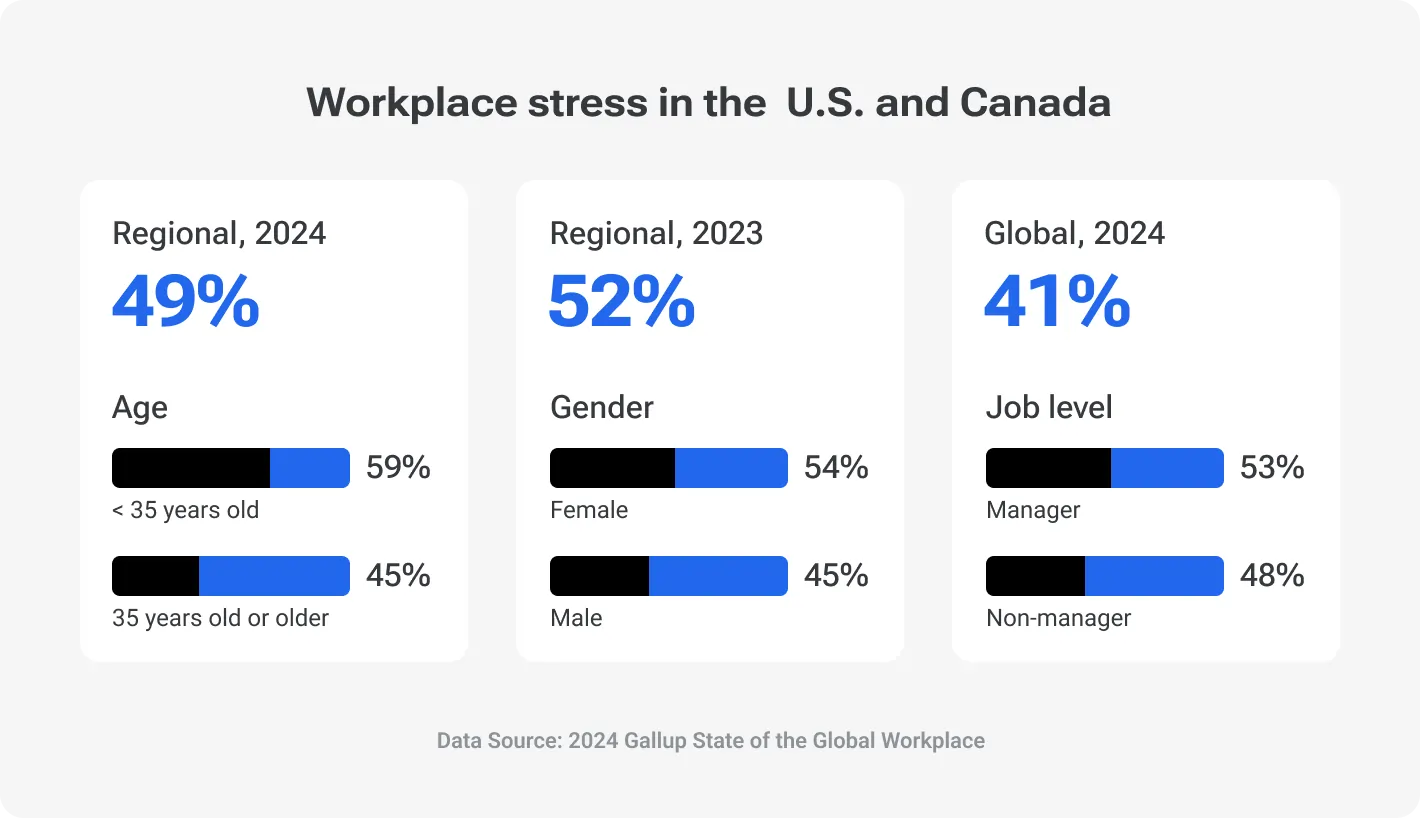Did you know that 9 in 10 Fortune 500 companies have long-term contracts with outside service providers to handle their IT needs? Big companies like Google and McKinsey & Co are choosing to outsource important tasks, and for good reason. These and the other 80% of businesses worldwide use software development outsourcing services to make their work easier, save money, and get special skills that they might not have in-house.
As a result, over 1 million new workers join the outsourcing industry each year, showing great demand for outsourcing. Now, even small businesses are catching on, 37% of them are now using outsourcing to help them compete better.
Yet, many companies wait too long to consider outsourcing, often in times of trouble. By learning when to outsource software development, and spotting the five clear signs early, you can grow steadily, maintain quality, and stay strong in a fast-moving market.
#1. Your in-house team is overwhelmed
Stress at work is a significant issue for many employees. In the UK, work is the third-biggest cause of stress, right after sleep problems and money issues. A hefty workload can easily lead to stress, and LinkedIn noted that 60% of employees feel this pressure at their jobs.
In the US, the American Psychological Association found that 77% of Americans felt work-related stress in the past month. More than half, about 57%, said they faced stress-caused burnout. The financial cost of workplace stress is staggering, hitting around $300 billion each year in the US alone.
End-to-end solutions with predictable budgets, a time-to-market advantage with budget savings of up to 50%
Almost half of American workers report feeling tense during their workday, with that number rising to 61% among those who feel less secure in their jobs. Furthermore, over 67% say they experienced at least one sign of burnout recently, like lack of energy, feelings of loneliness, or reduced effort at work. This burnout is pushing many employees to leave – 43% of Millennials and 44% of Gen Z workers have quit a job due to burnout.
Persistent work-related stress can lead to various psychological problems, including anxiety disorders, depression, and chronic fatigue syndrome. Employees may experience feelings of hopelessness, irritability, or difficulty concentrating. In severe cases, prolonged stress can result in mental health issues like post-traumatic stress disorder (PTSD) or major depressive episodes.
As stress levels rise, productivity often falls. This is where outsourcing software development can provide relief by shifting workload to external experts. This change allows employees to focus on more important and engaging work, which can potentially lead to a 7% drop in employee turnover, according to Gartner.
How outsourcing solves key workplace challenges
Challenge
Current impact on team
Outsourcing solution
Expected outcome
Increased stress and burnout among employees.
Delegate repetitive and low-value tasks to external experts.
Reduced workload for in-house team; less stress.
Decreased productivity and project delays.
Outsource time-sensitive tasks to ensure timely completion.
Improved adherence to deadlines and project timelines.
Declining quality of work
Quality issues and decreased employee morale.
Enhanced quality of deliverables and increased morale.
Limited time for strategic thinking and creative solutions.
Free up resources for research and development initiatives.
Increased focus on innovation and creative problem-solving.
High turnover rates due to stress and burnout.
Improve job satisfaction by alleviating work pressure.
Reduction in turnover rates; better employee retention.
Team members feel unsupported and disconnected.
Foster collaboration by allowing teams to focus on core responsibilities.
Enhanced team cohesion and communication.
Moreover, outsourcing can help companies free up valuable resources, allowing them to put about 12% more into innovation and research and development. This shift encourages a workplace culture that values creative problem-solving, helping businesses stay competitive.
If your team is overwhelmed — missing deadlines, feeling burnt out, and producing lower quality work — it might be the right moment to ask when to outsource software development and bring in outside specialists. Offloading tasks to external specialists can ease the burden on your employees, boosting morale and productivity in the long run.
#2. You’re struggling to find the right talent
Many employers are having a tough time finding skilled workers. A recent study showed that nearly 4 in 5 employers around the world are facing this issue. It’s not because robots are taking all the jobs – on the contrary, there aren’t enough people available to fill them. By 2030, experts predict that there will be a shortage of over 85 million skilled workers worldwide. This could lead to about $8.5 trillion in lost income each year if the situation doesn't improve.
Finding the right talent can take a long time. In a recent survey by TotalJobs, the average time to hire a suitable candidate was about 4.9 weeks. Larger companies often take even longer, with businesses that have over 1,000 employees taking an average of 5.5 weeks to find the right person. No wonder, more than half of recruiters — 52% — say they feel pressured to fill open positions quickly.
The problems recruiters face keep coming back to a few main points:
Skill shortages: Many positions require specialized skills, particularly in fields like software development. There are simply not enough candidates with these skills to meet the growing demand. About 61% of companies struggle to find candidates who fit well with the job.
Changing candidate expectations: Today's job seekers often have higher expectations regarding work-life balance, benefits, and company culture. Many businesses struggle to meet these demands, which can deter potential candidates.
Limited recruitment resources: Smaller companies may lack the resources or time to effectively market their job openings or to go through a thorough recruitment process.
Geographical limitations: If a company is only looking for talent in its local area, it may be missing out on skilled candidates from other regions or countries.
This situation is particularly challenging when it comes to hiring skilled software developers. The tech industry is highly competitive, making it hard to know when to outsource software development and bring in external experts to cover talent gaps.
One effective solution to these challenges is software outsourcing, which instantly connects businesses to a global talent pool. This means you can quickly find skilled professionals for your software development projects without the lengthy recruitment process. Outsourcing allows you to focus on your core business activities, while still getting the expertise you need to succeed in a competitive market.
#3. You need to accelerate your development timeline
The term "time to market" is often mentioned in discussions about business strategies, and for good reason. It refers to the time it takes from the initial idea for a product or service until it is available for customers. This timeline can greatly affect your company's success, as the quicker you can deliver, the better your chances to lead in the marketplace.
Delays in launching products can have serious financial consequences. A McKinsey study highlights that products released six months later than planned can earn a staggering 33% less profit over five years compared to those launched on time. The reasons for this drop in profits can vary, but they often stem from increased competition, missed market opportunities, and shifting consumer preferences.
On the other hand, products that are launched on time but exceed their budget by 50% only see a minor profit reduction of about 3.5%. This indicates that it’s not just about being fast; it's also about managing resources effectively.
An effective strategy to accelerate your development timeline is to consider outsourcing. By delegating non-critical tasks or functions, your business can streamline its processes and focus more on core competencies. Research from Bain & Company shows that outsourcing can enhance efficiency by up to 25%, allowing businesses to prioritize what truly drives success while relying on external partners to manage essential yet less critical tasks.
Additionally, outsourcing non-critical functions can lead to faster product or service launches. The 2023 Outsourcing ROI Report by Aberdeen Group, indicates that outsourcing can result in a 25% reduction in time-to-market, according to various studies.
Getting products to market quickly is important not just for smoother work inside your company but also for keeping customers happy. People today expect fast service and quick access to products. If you can’t deliver, you risk losing customers and business opportunities. In a competitive market, every delay costs money and can push you behind.
Outsourcing can help speed things up. It lets you simplify processes, tap into expert skills, and use your resources more wisely. By outsourcing, you can work more efficiently, meet customer needs faster, and give your business a stronger chance to succeed.
7 mistakes to avoid in outsourcing software development
#4. You want to optimize costs without compromising quality
Finding ways to save money while still keeping high quality is very important for businesses today. This trend is growing, and it is expected that money made from outsourcing will increase by about 7.54% each year until 2027.
Many businesses find that by doing this, they can reduce their development costs by around 15% to 30%. This is a big help, especially for companies that want to stay competitive.
Ukraine and Poland offer rates that are 20-25% lower than counterparts in the US and Western Europe This shift shows that companies are looking for the best quality work at lower prices.
A survey found that nearly half of HR leaders believe saving money is the main reason to outsource. This is a clear sign that cost savings are a big reason businesses are choosing to go this route. The global outsourcing market is largely driven by the potential for lower costs, with companies reporting an average savings of 19% in their day-to-day expenses.
Keeping a large in-house team can be costly. You have to pay salaries, benefits, and training, which can all add up. Outsourcing can help businesses lower many of these costs. When companies choose to work with outside teams, they can focus on what they do best without worrying about the high costs of staff.
A common worry about outsourcing is whether it will affect the quality of the work. However, outsourcing can actually lead to better quality in many cases. When companies use staff augmentation services, they can work with teams who are experts in their specific fields. This means that the job can be done by skilled people who have a lot of experience.
For example, if a company needs to build software, outsourcing can connect them with a team that specializes in exactly that. These experts can bring new ideas, modern skills, and advanced tools to the table, helping improve the final product. In this way, outsourcing can raise the quality of work and give companies an advantage over their competitors.
Today, most businesses aim to save money while still keeping high quality. Outsourcing is one of the best ways to do this. It helps companies lower costs without cutting corners. By working with skilled external teams, businesses can spend their resources smarter and focus on what they do best.
The growth of outsourcing in new markets shows that companies are rethinking how they manage costs and talent. In the end, outsourcing helps businesses run more smoothly while still delivering great value to their customers.
#5. You require more flexibility to scale up or down
Companies need to be ready to change quickly. Market demands can shift overnight, and businesses must adapt to stay competitive. One great way to achieve this flexibility is through outsourcing. In fact, a study found that 42% of CTOs see outsourcing as a key solution for quickly scaling their operations. This allows companies to respond to changes in the market more effectively.
Markets can change for many reasons, contributing to the dynamic nature of business environments:
-
The introduction of new technologies can disrupt existing markets and create new ones.
-
Consumer preferences are constantly evolving, influenced by trends, cultural movements, and social values.
-
Economic conditions, such as recessions, inflation, or shifts in consumer spending power, can dramatically affect markets.
In each of these scenarios, the ability to understand and respond to changes is crucial. Businesses that are proactive rather than reactive stand a better chance of maintaining their position and capitalizing on new opportunities, ensuring they remain relevant.
For example, if a company suddenly receives a large order, it may need to increase its production capacity quickly to meet customer demand. On the other hand, if the market slows down, the company might need to reduce its workforce to save money.
Outsourcing gives companies the ability to easily scale their resources up or down as needed. When a business needs more support or additional expertise, it can quickly hire an outside team to help. This means that organizations do not have to go through the long process of hiring full-time employees, which can take time and effort. Instead, they can simply add outsourced workers to meet their needs.
For example, if a software company is launching a new app, it may need extra developers for a short time. By outsourcing, the company can quickly bring on skilled developers who can work on the project without committing to hiring them permanently. Once the project is complete, the company can easily reduce its outsourced team without any complicated layoffs.
This flexibility is especially valuable for startups and small businesses that may not have the resources to maintain large teams all the time. Outsourcing allows them to access the talent they need when they need it, leading to more efficient operations and better results.
Conclusion
Outsourcing is a smart way to grow your business and keep it moving forward. It gives you access to experts when you need them, helps you cut costs, and lets you focus on what matters most. Some of the main benefits include:
Work with specialists who bring skills your team may not have in-house
Reduce costs and use your resources more effectively
Free up time to focus on core business activities that drive growth
Stay flexible and adapt quickly to changes in the market
Deliver projects faster and reach your goals sooner
If you’re wondering when to outsource software development, the answer may be now. At Devico, we’ll help you find the right solution, get expert support, and achieve real results. Let’s build something great together.
Motivated and focused experts for up to 60% less than locals, delivered in days, not months




